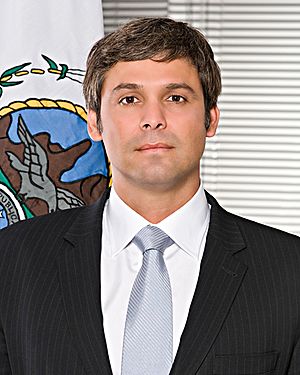Lindbergh Farias facts for kids
Quick facts for kids
Lindbergh Farias
|
|
|---|---|
 |
|
| Member of the Chamber of Deputies | |
| Assumed office 1 February 2023 |
|
| Constituency | Rio de Janeiro |
| In office 1 February 2003 – 21 December 2004 |
|
| Constituency | Rio de Janeiro |
| In office 1 February 1995 – 1 February 1999 |
|
| Constituency | Rio de Janeiro |
| Member of the Municipal Chamber of Rio de Janeiro | |
| In office 1 January 2021 – 1 February 2023 |
|
| Constituency | At-large |
| Senator for Rio de Janeiro | |
| In office 1 February 2011 – 1 February 2019 |
|
| Preceded by | Régis Fichtner |
| Succeeded by | Flávio Bolsonaro |
| Mayor of Nova Iguaçu | |
| In office 1 January 2005 – 31 March 2010 |
|
| Vice Mayor | Sheila Gama |
| Preceded by | Mário Marques |
| Succeeded by | Sheila Gama |
| President of the National Union of Students | |
| In office 1992–1993 |
|
| Preceded by | Patricia de Angelis |
| Succeeded by | Fernando Gusmão |
| Personal details | |
| Born |
Luiz Lindbergh Farias Filho
8 December 1969 João Pessoa, Paraíba, Brazil |
| Political party | PT (2001–present) |
| Other political affiliations |
|
| Spouse |
Maria Antonia Goulart
(m. 1994; div. 2018) |
| Domestic partner | Gleisi Hoffmann (2020–present) |
| Children |
|
Luiz Lindbergh Farias Filho, known as Lindbergh Farias (born December 8, 1969), is a Brazilian politician. He was also a leader of student groups.
Lindbergh became well-known in 1992 as the president of the National Union of Students (UNE). He was a key leader in the "Painted Faces" student movement. This movement called for changes in the government.
After his time as a student leader, he became a Federal Deputy twice. He also served as the Mayor of Nova Iguaçu. In 2010, Lindbergh was elected as a Senator for the state of Rio de Janeiro.
In 2014, he ran to become the Governor of Rio de Janeiro. He was a candidate for the Workers' Party (PT).
Contents
Lindbergh Farias: Early Life
Childhood and Family
Lindbergh Farias was born on December 8, 1969, in João Pessoa. This city is the capital of Paraíba, a state in Brazil. His father, Luiz Lindbergh Farias, was a doctor. His mother, Ana Maria, was a university professor.
He was named after his father. His grandfather was named after the American aviator Charles Lindbergh. Charles Lindbergh was famous for being the first person to fly alone across the Atlantic Ocean in 1927. Lindbergh grew up in Paraíba with his three siblings: Fred, Rodrigo, and Georgiana.
Becoming a Student Leader
Lindbergh's family had a history of political involvement. His grandfather supported the Communist Party. His father was also a student leader in 1961. Lindbergh grew up learning about left-wing ideas. By age 14, he considered himself a socialist.
At 16, he joined the Communist Party of Brazil (PCdoB). He became active in their youth group. A few years later, he was elected as the National President of the Union of the Socialist Youth (UJS).
When he was 17, Lindbergh started studying Medicine at the Federal University of Paraíba. In 1990, he began studying Law. He also joined the Students' Central Directory (DCE). At 21, Farias was elected Secretary-General of the National Union of Students. He then moved to São Paulo.
In 1992, Lindbergh Farias became the president of the UNE. This was a big step in his political journey. That same year, he met Luiz Inácio Lula da Silva, who was a union leader at the time.
The "Painted Faces" Movement
As president of UNE, Lindbergh moved to Rio de Janeiro. In 1992, he led a major student movement called "Painted Faces." Students painted their faces to show their support for change. This movement played a big part in the calls for the then-president Fernando Collor de Mello to leave office.
Lindbergh once described a march during this time. He said, "We left the museum, walked through Avenida Paulista, went down to Avenida Brigadeiro Luiz Antônio and finished in front of the Law School of USP."
Lindbergh Farias: Political Journey
Lindbergh was elected as a Federal Deputy in 1994. He ran for the Communist Party of Brazil. He received the most votes among left-wing candidates. In 1996, he was elected National President of the Union of the Socialist Youth.
In 1997, he joined a different party, the Unified Workers' Socialist Party (PSTU). As a Federal Deputy, he often disagreed with the government of Fernando Henrique Cardoso from the PSDB.

